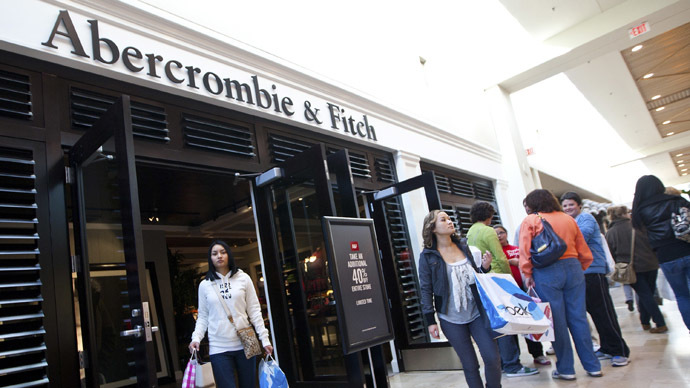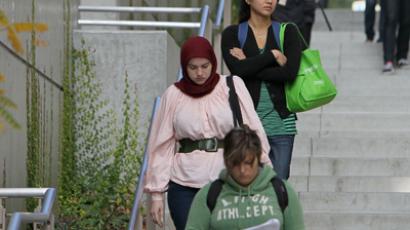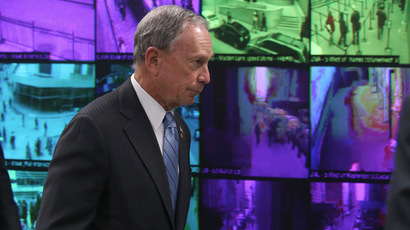Supreme Court considers Muslim hijab discrimination case against Abercrombie & Fitch

The US Supreme Court will hear arguments in a case Wednesday over whether employers such as retail giant Abercrombie & Fitch must automatically offer religious accommodation for applicants and employees, or whether such accommodation must be requested.
The case goes back to 2008, when Samantha Elauf, a Muslim, applied to work at an Abercrombie & Fitch Kids store in Tulsa, Oklahoma for a “model” position – or a sales job, in Abercrombie parlance.
Abercrombie has a strict “Look Policy” dress code for its employees, requiring what it calls an East Coast collegiate or preppy style. At the time of Elauf’s interview, the policy governed clothes, jewelry and hair, barring hats and black clothing.
Elauf, 17 years old at the time, wore a black headscarf, along with jeans and a t-shirt, to her interview with an assistant store manager. Though the interview went well, Elauf’s friend who worked at the store told her that the assistant manager suggested the store did not hire her because of her headscarf.
SCOTUS hears #ElaufvAbercrombie today. We joined a brief on behalf of the plaintiff, denied a job over her hijab: http://t.co/5YaqNgLCSu
— Americans United (@americansunited) February 25, 2015
Elauf eventually took the news to the US Equal Employment Opportunity Commission, which sued Abercrombie in federal court on her behalf, alleging the store had crossed Title VII of the Civil Rights Act of 1964. The rule prohibits employers from refusing to hire someone based on religious practices unless it can show it would be an “undue hardship” to allow the practice.
The lawsuit said Abercrombie should have made an exemption in its “Look Policy” for Elauf’s religious beliefs.
READ MORE:Supreme Court unanimously upholds right for Muslim inmate to grow religious beard
The federal government won in a trial court, with a jury awarding Elauf $20,000 in damages. Yet the US Court of Appeals for the Tenth Circuit reversed the decision, ruling for Abercrombie. The appeals court contended that the store could not be liable for violating anti-discrimination laws because it ultimately did not know – and Elauf did not say – whether she was wearing the headscarf based on religious beliefs.
In EEOC v. Abercrombie & Fitch, the federal government has called on the Supreme Court to recognize that a would-be employee like Elauf is not solely responsible for notifying an employer of religious practices. The government has argued that an employer can’t refuse to hire someone when it correctly understands the applicant’s religious practices, even if the applicant has not explicitly indicated what those beliefs are, as was the case for Elauf.
The government says an employer could get around anti-discrimination laws if it claims it is not certain about one’s religious practices. Plus, the government says an employer would know better of its own policies and when they might conflict with an applicant or employee’s religious beliefs.
READ MORE: Supreme Court allows some employers to drop contraception coverage from healthcare plans
Abercrombie says that such a burden is more complicated than the government claims: how would the company know when an applicant may need an exemption, the store has asked, and how would it handle religions that either aren’t well known, or when members of a certain faith disagree on practices?
"Accommodating religious practices is not always straightforward, in large part because it can be hard to tell who wants or needs accommodation," Abercrombie said in its legal brief to the court. "It is generally the employee's or applicant's duty ask for an accommodation -- not the employer's job to guess."
"Employers are not supposed to ask about religious views or practices," Abercrombie added in its brief.
Many religious advocacy groups – including Muslims, Christians, Jews, and Sikhs – have spoken up in support of Elauf, as well as a gay-rights organization, according to USA Today.
In a legal brief filed in the case on behalf of Orthodox Jews, lawyer Nathan Lewin said requiring job applicants to ask for special treatment for religious practices may mean they are less likely to be hired with no reason given for the denial.
According to AP, Lewin said in the filing that Orthodox Jews, who are required to wear a yarmulke and may not work on Saturdays, are often advised not to divulge such information until after they are hired.
Abercrombie has since relaxed its policy regarding head scarves, yet the no-black rule is still in place.
"A&F has a longstanding commitment to diversity and inclusion, and consistent with the law, has granted numerous religious accommodations when requested, including hijabs," the company said in a statement













